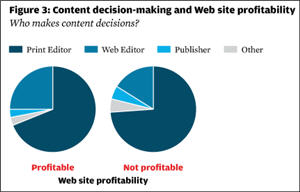 In the conclusion of Columbia Journalism Review’s recent study, “Magazines and Their Web Sites,” the authors ask:
In the conclusion of Columbia Journalism Review’s recent study, “Magazines and Their Web Sites,” the authors ask:
“What are the deepest implications of the finding that when a Web editor is in charge of both budget and content decisions, that traffic and revenue increase but quality and ethical standards decrease?”
That question made us go back and take a closer look at the study’s findings about sites run by Web-only editors.
These findings were widely reported:
- Magazine websites are more likely to be profitable and have higher traffic if an independent Web editor is in charge of the budget and content.
- Magazines with independent Web editors in charge of content decisions are about twice as likely to have a less rigorous fact-checking process for Web content than magazine editors have for print content, and almost three times as likely to have no fact-checking at all.
- Web editors who are in charge of content decisions are more likely to correct errors on their site, but they are also less likely to notify users of the corrections.
But these findings–equally interesting, if not more so–were less widely reported:
- When independent Web editors are in charge of online content, there is a greater tendency to have separate, dedicated staffs for print and Web, rather than a staff expected to work in both media.
- When independent Web editors are in charge of budgets, their sites are more likely to have a dedicated Web advertising team than when print editors or publishers are in charge.
- Magazine websites are more likely to have blogs when independent Web editors are in charge of the budget.
- When independent Web editors are in charge of budget or content decisions, their sites are more likely to have or include digital editions, RSS, podcasts, and versions of the site designed for mobile phones and e-books.
In other words, sites run by Web-only types are more likely to focus on and take full advantage of a digital approach—to be more Web-native. Which may be one reason why those sites have more traffic and are more profitable.
Yes, fact-checking is important. But the survey didn’t examine whether lower standards affect accuracy; newspapers, after all, traditionally have not used fact-checkers. What’s more, standards of fact-checking can easily be addressed–while successful strategies for online advertising, digital extensions, traffic growth, and profitability are way harder to come by.
Mind you, we strongly advocate collaboration and communication between the print and digital sides of a magazine or media company. But these findings suggest that for a magazine to find its voice online, it needs dedicated, online-only managers and thinkers.
So here’s our answer to CJR’s question: The deepest implication seems to be that a Web-only editor can make a magazine’s site the forward-looking, digital native it needs to be in order to succeed. If there’s a choice, why hire anyone else?
Do you agree? Disagree? Please leave a comment and let us know.




First off, let me acknowledge that I haven’t read the report, I’m just commenting on the information on this post, so I may very well be overlooking some crucial information.
What I found most interesting is that the items that you mention as being widely reported put the responsibility for profitability, etc., on the shoulders of the editor in charge. But looking at the additional findings, it seems that it’s more about the business model. If a company has a web strategy in place and backs that strategy up with ad and edit staff, etc., then it’s more likely to make money online. Of course, the company needs to support the web team and trust that they know their medium best, as it trusts the print team to know its medium best. I’m having flashbacks to the Berlin Hall Wired/Wired.com comment thread.
So where do iPad/smart phone apps fit in?